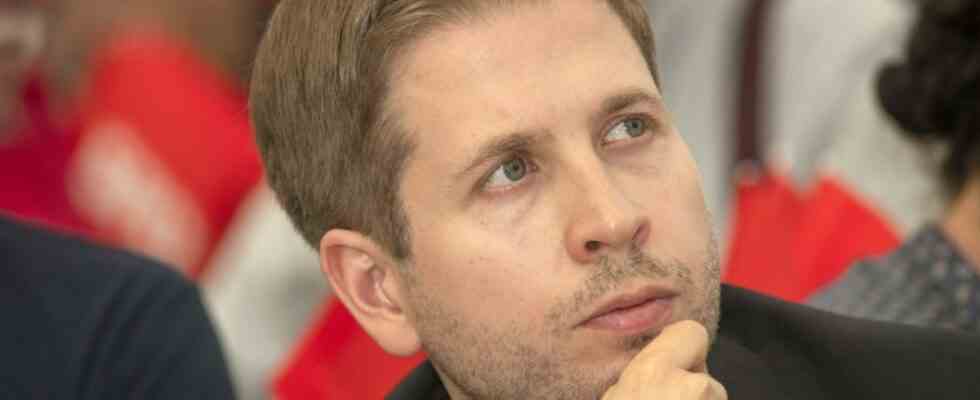One does not know whether Kevin Kühnert ever phoned Robert Habeck, so from abstinent to abstinent willing. Habeck, then head of the Greens and now Minister of Economics, could have told Kühnert, Secretary General of the SPD, what it was like in 2019, when Habeck decided to say goodbye to Twitter (and Facebook). How the weaning phase went, whether there were withdrawal symptoms, whether he regretted the decision at some moments, things like that.
“This account does not exist” was suddenly read on Monday when you clicked on Kühnert’s profile on Twitter. Maybe it was hacked, some might have thought at first. But in one Video interview with the editorial network Germanywhich was shown on Monday evening, Kühnert explained why he no longer wants to be on Twitter, even though he has 370,000 followers there and reaches many more people who don’t follow him directly, but see his posts.
The, let’s call it, waivers from Kühnert and Habeck look the same at first glance. Kühnert says in September 2022: “I simply think that the discussion culture that takes place on Twitter and the way in which society is represented there or, I would say absolutely not represented at all, leads to false conclusions and errors in political decisions. At least that’s what I’ve found in myself, that if I spend too much time on this app I have a distorted perception of reality”.
Habeck wrote, in January 2019, in a statement on his blog: “Twitter is more aggressive than any other digital medium. And in no other medium is there so much hatred, maliciousness and hate speech. Apparently Twitter triggers something in me: to be more aggressive, louder, more polemical and pointed – and all that at a speed that makes it difficult to leave room for reflection.”
The cases are also similar in another respect. The Twitter off is always the reaction to unsuccessful public statements before. Habeck had spoken about the Thuringia election in a video he had recorded himself, and hateful commentators – and Twitter is full of them – interpreted a thrown-out sentence as if he had previously denied Thuringia that it was democratic and only by strong ones Greens to be able to become democratic.
bold gave an interview on n-tv on Monday morning, which he subsequently described as “not one of the best interviews of my career”. When asked by the moderator about demands to deliver battle tanks to Ukraine, he first repeated the position that the chancellor had been advocating for weeks, namely that Germany would not go it alone on this issue – a purely evasive answer, of course, so as not to position itself clearly have to. So far, so usual for an SPD general secretary who doesn’t want to stab the chancellor in the back. However, Kühnert garnished his statement with the sentence that “we don’t want to be insidiously drawn into this war, that we don’t want to encourage Russia to act completely irrationally and to attack other countries.”
This sentence was interpreted on Twitter as if he didn’t care about the fate of the people in Ukraine and as if he were anticipating an unforeseeable Russian reaction to the deliveries of tanks. Twitter users insulted him as “Gas-Gerd’s” grandson, and the entire SPD was dubbed “Putin’s fifth column.”
It is interesting that Kühnert justified his withdrawal from one social media in another social media. In the interview with the RND, he justified his refusal to use Twitter by saying that he had hardly used that medium for months and that it just didn’t seem to be the right communication channel for him at the moment, he chatted on Instagram late Monday evening in the format “The K Question” with SPD leader Lars Klingbeil and provided an explanation that sounded more plausible than just before the RND. He was simply annoyed by all the comments about his statement on the tank deliveries and had just decided that it was “okay now”.
And, unlike Habeck back then, Kühnert leaves a back door. A back door that, as the Instagram video looks, may be pushed open a bit by Lars Klingbeil, who occasionally has a conversation with Kühnert that looks like a mixture of media coaching and a communication science proseminar. Yes, says Klingbeil, Twitter is “sometimes very toxic”. He, however, uses it less for sending and much more for receiving. He finds the tweets, for example, from Carlo Masala, the military expert from the Bundeswehr University, very helpful, although he is often far removed from the positions of the SPD. But the comments on Twitter have little to do with the reality of the people in the country; they are only a “burning glass for self-employment” that one is exposed to in the Berlin political bubble.
The withdrawal from Twitter “will not be a permanent decision now”, says Kevin Kühnert at the end of the passage, here from minute 38:25 about. Let’s wait and see when he relapses again.
Klingbeil studied sociology, among other things. Kühnert studied communication science for a few semesters before dropping out of his studies and starting in a call center. The two must have heard of the famous psychologist Paul Watzlawick. One of his most important sentences was: One cannot not communicate.

